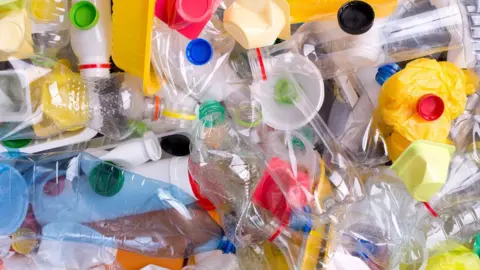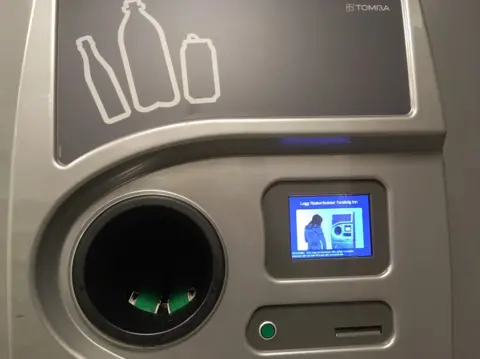Deposit return scheme: Who would pay?
 Getty Images
Getty ImagesThe price of bottles and cans of drinks would have to rise to help pay for the government's proposed deposit return scheme, according to the plastics industry.
The government wants a returnable deposit on single use containers to help cut waste and boost recycling.
But the plastics industry said prices would also need to go up to help pay for the necessary infrastructure.
The government said the cost would have to be "proportionate" to any benefits.
The planned scheme, which is now subject to consultation before any final decision is made, is expected to cover single-use glass and plastic bottles, and steel and aluminium cans.
It has been welcomed by environmental campaigners.
Similar schemes elsewhere charge deposits ranging from 22p in Germany and 8p in Sweden.
Consumers get the money back when they return the containers, which is often done through a network of reverse vending machines, where you insert a bottle or can and the machine returns your money.

Barry Turner, a director at the British Plastics Federation, said tens of thousands of reverse vending machines machines would be required to make it in convenient enough to motivate people to return containers.
Drink makers and retailers would probably have to pay for that recycling network, Mr Turner said and he thinks they would pass some of that cost on to consumers.
"It's inevitable prices will go up, the difficult question to answer is by how much".
"If you look at the retail and whole supply chain, it's not as if there's huge profits.
"If there's a knock-on cost consumers will pay in some way or another," he said.
'Proportionate costs'
At the moment, plastics producers pay just 10% of the cost of recycling packaging.
Defra's consultation on the deposit return scheme asks for feedback from producers, suppliers and consumers.
The department said the options for a deposit return scheme would be considered alongside other policies to improve recycling rates.
"The government will only take forward options from the consultation which demonstrate that they offer clear benefits and are resistant to fraud, and costs on businesses, consumers and the taxpayer are proportionate," it added.
The British Plastics Federation's Mr Turner said the plastics industry was not opposed to the idea of a deposit return scheme, but it did not want to see "knee-jerk regulation".
"The important thing is it's a consultation, they are still taking evidence, they are looking at the best way to design it for the UK."
